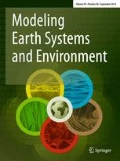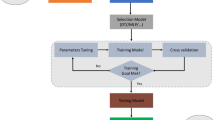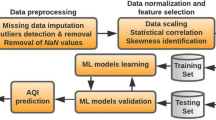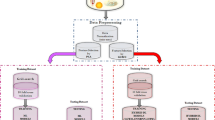Abstract
Hydrological forecasts have been developed since the earliest civilizations allowing to plan actions such as agriculture, grain storage, and the construction of reservoirs to supply water during long periods of drought. These forecasts are becoming increasingly essential given the growing dependence on water resources in the most diverse activities such as hydroelectric power generation. In this study, we develop a hybrid approach to forecasting the daily flow of the Zambezi River at the Cahora Bassa dam in Mozambique. These forecasts use daily historical data on flow, evaporation, relative humidity, and rainfall to predict the weather one day in advance. The model employs the seven past days as inputs to the Group Method of Data Handling (GMDH) algorithm optimized by the Particle Swarm Optimization (PSO) algorithm. GMDH is a neural network composed of neurons arranged in several layers, consisting of polynomial functions with two variables combined in a cascade to produce the output at the end of the network. The PSO promotes a search for optimal GMDH parameters to minimize the error values between the predicted and the actual river flow observed values. The simulations are performed 25 times to reduce the effects of the random values characteristic of the tested models. The results obtained by the proposed approach are compared with the other neural networks, such as extreme learning machine (ELM) and Multi-layer perceptron (MLP). The models’ performances were compared using five metrics, statistical tests, and uncertainty analysis. These results show that the GMDH model produced better flow prediction capability than the other two models.










Similar content being viewed by others
Abbreviations
- AI:
-
Artificial intelligence
- ANFIS:
-
Adaptive neuro-fuzzy inference systems
- ANN:
-
Artificial neural networks
- ANOVA:
-
Analysis of variance
- ARIMA:
-
Autoregressive integrated moving average
- ELM:
-
Extreme learning machine
- GLSSVM:
-
Group Method of Data Handling algorithm + Least Squares Support Vector Machine
- GMDH:
-
Group Method of Data Handling algorithm
- GP:
-
Gaussian process
- GS-GMDH:
-
Generalized Structure of Group Method of Data Handling algorithm
- KGE:
-
Kling–Gupta efficiency
- LSSVM:
-
Least squares support vector machine
- MAD:
-
Mean absolute deviation
- MAE:
-
Mean absolute error
- MLP:
-
Multi-layer perceptron regress
- MSE:
-
Mean square error
- NSE:
-
Nash–Sutcliffe efficiency
- PSO:
-
Particle swarm optimization
- RF:
-
Random forest
- RMSE:
-
Root-mean-square error
- SARIMA:
-
Seasonal autoregressive integrated moving average
- SVR:
-
Support vector regressor
- VKG:
-
Volterra–Kolmogorov–Gabo
References
Adnan RM, Liang Z, Parmar KS et al (2021) Modeling monthly streamflow in mountainous basin by mars, gmdh-nn and denfis using hydroclimatic data. Neural Comput Appl 33(7):2853–2871. https://doi.org/10.1007/s00521-020-05164-3
Ahmed AM, Deo RC, Ghahramani A et al (2022) New double decomposition deep learning methods for river water level forecasting. Sci Total Environ 831(154):722. https://doi.org/10.1016/j.scitotenv.2022.154722
Akusok A, Björk KM, Miche Y et al (2015) High-performance extreme learning machines: a complete toolbox for big data applications. IEEE Access 3:1011–1025. https://doi.org/10.1109/ACCESS.2015.2450498
da Silva AML, de Resende LC, da Fonseca Manso LA et al (2007) Composite reliability assessment based on monte carlo simulation and artificial neural networks. IEEE Trans Power Syst 22(3):1202–1209. https://doi.org/10.1109/TPWRS.2007.901302
de Souza DV, Pereira da Luz M, Medero GM et al (2018) An overview of hydropower reservoirs in brazil: current situation, future perspectives and impacts of climate change. Water 10(5):592. https://doi.org/10.3390/w10050592
Dodangeh E, Panahi M, Rezaie F et al (2020) Novel hybrid intelligence models for flood-susceptibility prediction: meta optimization of the gmdh and svr models with the genético algorithm and harmony search. J Hydrol 590(125):423. https://doi.org/10.1016/j.jhydrol.2020.125423
Ebtehaj I, Sammen SS, Sidek LM et al (2021) Prediction of daily water level using new hybridized gs-gmdh and anfis-fcm models. Eng Appl Comput Fluid Mech 15(1):1343–1361. https://doi.org/10.1080/19942060.2021.1966837
Elkurdy M, Binns AD, Bonakdari H et al (2021) Early detection of riverine flooding events using the group method of data handling for the bow river, alberta, canada. Int J River Basin Manage 2021:1–12. https://doi.org/10.1080/15715124.2021.1906261
Franco VR, Hott MC, Andrade RG et al (2022) Hybrid machine learning methods combined with computer vision approaches to estimate biophysical parameters of pastures. Evol Intell 2022:1–14
Gupta HV, Kling H, Yilmaz KK et al (2009) Decomposition of the mean squared error and nse performance criteria: implications for improving hydrological modelling. J Hydrol 377(1–2):80–91. https://doi.org/10.1016/j.jhydrol.2009.08.003
Hussain D, Hussain T, Khan AA et al (2020) A deep learning approach for hydrological time-series prediction: a case study of Gilgit river basin. Earth Sci Inf 13(3):915–927. https://doi.org/10.1007/s12145-020-00477-2
Ikeda S, Ochiai M, Sawaragi Y (1976) Sequential gmdh algorithm and its application to river flow prediction. IEEE Trans Syst Man Cybern 7:473–479. https://doi.org/10.1109/TSMC.1976.4309532
Isaacman A (2021) Cahora bassa dam & the delusion of development. Daedalus 150(4):103–123. https://doi.org/10.1162/daed_a_01875
Ivakhnenko AG (1971) Polynomial theory of complex systems. IEEE Trans Syst Man Cybern 4:364–378. https://doi.org/10.1109/TSMC.1971.4308320
Jinlian L, Yufen Z, Jiaxuan L (2017) Long and medium term power load forecasting based on a combination model of gmdh, pso and lssvm. In: 2017 29th Chinese control and decision conference (CCDC), pp 964–969
Kennedy J (1995) Eberhart, r.: Particle swarm optimization. In: Proceedings of IEEE international conference on neural networks, IEEE Press, pp 1942–1948. Doi:https://doi.org/10.1109/ICNN.1995.488968
Khashei M, Bijari M (2010) An artificial neural network (p, d, q) model for timeseries forecasting. Expert Syst Appl 37(1):479–489. https://doi.org/10.1016/j.eswa.2009.05.044
Khodakhah H, Aghelpour P, Hamedi Z (2022) Comparing linear and non-linear data-driven approaches in monthly river flow prediction, based on the models sarima, lssvm, anfis, and gmdh. Env Sci Pollut Res 29(15):21935–21954. https://doi.org/10.1007/s11356-021-17443-0
Kling H, Stanzel P, Preishuber M (2014) Impact modelling of water resources development and climate scenarios on zambezi river discharge. J Hydrol: Reg Stud 1:17–43
Kondo T (1998) The learning algorithms of the gmdh neural network and their application to the medical image recognition. In: Proceedings of the 37th SICE annual conference international session papers, IEEE, pp 1109–1114. https://doi.org/10.1109/SICE.1998.742987
Kuo L (2016) Africa’s biggest hydropower plant may soon run out of water. https://qz.com/africa/862789
Le XH, Ho HV, Lee G et al (2019) Application of long short-term memory (lstm) neural network for flood forecasting. Water 11:7. https://doi.org/10.3390/w11071387
Liu D, Jiang W, Mu L et al (2020) Streamflow prediction using deep learning neural network: case study of Yangtze river. IEEE Access 8:90069–90086. https://doi.org/10.1109/ACCESS.2020.2993874
Liu W, Dou Z, Wang W et al (2018) Short-term load forecasting based on elastic net improved gmdh and difference degree weighting optimization. Appl Sci 8(9):1603. https://doi.org/10.3390/app8091603
Loucks DP, Beek Ev (2017) Water resources planning and management: an overview. In: Water resource systems planning and management, pp 1–49. https://doi.org/10.1007/978-3-319-44234-1_1
Moore AE, Cotterill FP, Main MP et al (2007) The zambezi river. In: Large rivers: geomorphology and management, pp 311–332. https://doi.org/10.1002/9780470723722.ch15
Moosavi V, Talebi A, Hadian MR (2017) Development of a hybrid wavelet packet-group method of data handling (wpgmdh) model for runoff forecasting. Water Resour Manage 31(1):43–59. https://doi.org/10.1007/s11269-016-1507-3
Nash JE, Sutcliffe JV (1970) River flow forecasting through conceptual models part i-a discussion of principles. J Hydrol 10(3):282–290. https://doi.org/10.1016/0022-1694(70)90255-6
Nishikawa T, Shimizu S (1982) Identification and forecasting in management systems using the gmdh method. Appl Math Model 6(1):7–15. https://doi.org/10.1016/S0307-904X(82)80016-4
Parsaie A, Azamathulla HM, Haghiabi AH (2018) Prediction of discharge coefficient of cylindrical weir-gate using gmdh-pso. ISH J Hydraul Eng 24:116–123
Pedregosa F, Varoquaux G, Gramfort A et al (2011) Scikit-learn: machine learning in Python. J Mach Learn Res 12:2825–2830. https://scikit-learn.org/stable/about.html
Samsudin R, Saad P, Shabri A (2011) River flow time series using least squares support vector machines. Hydrol Earth Syst Sci 15(6):1835–1852. https://doi.org/10.5194/hess-15-1835-2011
Saporetti C, Fonseca D, Oliveira L et al (2022) Hybrid machine learning models for estimating total organic carbon from mineral constituents in core samples of shale gas fields. Mar Petrol Geol 2022:105783
Shaghaghi S, Bonakdari H, Gholami A et al (2017) Comparative analysis of gmdh neural network based on genetic algorithm and particle swarm optimization in stable channel design. Appl Math Comput 313:271–286
Shaofu M, Al-Juboori AM, Alwan AH et al (2021) On the investigation of monthly river flow generation complexity using the applicability of machine learning models. Complexity 2021:5. https://doi.org/10.1155/2021/3721661
Sharma A, Onwubolu G (2009) Hybrid particle swarm optimization and gmdh system. In: Hybrid self-organizing modeling systems. Springer, p 193–231
Spalding-Fecher R, Chapman A, Yamba F et al (2016) The vulnerability of hydropower production in the zambezi river basin to the impacts of climate change and irrigation development. Mitig Adapt Strat Glob Change 21(5):721–742. https://doi.org/10.1007/s11027-014-9619-7
Tukey J (1949) Comparing individual means in the analysis of variance. Biometrics 5(2):99–114. https://doi.org/10.2307/3001913
Yaseen ZM, Sulaiman SO, Deo RC et al (2019) An enhanced extreme learning machine model for river flow forecasting: state-of-the-art, practical applications in water resource engineering area and future research direction. J Hydrol 569:387–408. https://doi.org/10.1016/j.jhydrol.2018.11.069
Zhang G, Qi M (2005) Neural network forecasting for seasonal and trend time series, decision support systems in the internet age. Eur J Oper Res 160(2):501–514. https://doi.org/10.1016/j.ejor.2003.08.037
Funding
This work were supported by Coordenação de Aperfeiçoamento de Pessoal de Nível Superior (Grant no. 001), Universidade Federal de Juiz de Fora, CNPq (Grant no. 429639/2016), Fundação de Amparo a Pesquisa do Estado de Minas Gerais (Grant no. APQ-00334/18) and GCUB/PROAFRI (Grant no. 001/2018).
Author information
Authors and Affiliations
Corresponding author
Ethics declarations
Conflict of interest
On behalf of all authors, the corresponding author states that there is no conflict of interest.
Additional information
Publisher's Note
Springer Nature remains neutral with regard to jurisdictional claims in published maps and institutional affiliations.
Rights and permissions
Springer Nature or its licensor holds exclusive rights to this article under a publishing agreement with the author(s) or other rightsholder(s); author self-archiving of the accepted manuscript version of this article is solely governed by the terms of such publishing agreement and applicable law.
About this article
Cite this article
Souza, D.P.M., Martinho, A.D., Rocha, C.C. et al. Hybrid particle swarm optimization and group method of data handling for short-term prediction of natural daily streamflows. Model. Earth Syst. Environ. 8, 5743–5759 (2022). https://doi.org/10.1007/s40808-022-01466-8
Received:
Accepted:
Published:
Issue Date:
DOI: https://doi.org/10.1007/s40808-022-01466-8




